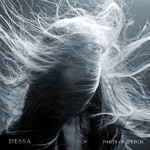Dessa, Parts of Speech

First things first: yes, Dessa is a member of the ever-awesome Doomtree hip-hop collective out of Minneapolis, but that doesn’t mean she’s a rapper. Actually, scratch that; that doesn’t mean she’s just a rapper. She’s something else entirely, something that can’t be easily encapsulated by that one label, and yeah, that’s an amazing, wonderful thing.
She’s been heading this direction for a while now — see 2011’s Castor, The Twin — but with Parts of Speech, it feels like she’s finally there. And “there” is less hip-hop than it is dusky, fragile, fractured soul, the kind that’s beautiful and unforced and sweet but tinged with regret and bitterness and anger all the same. Dessa’s always been a thoughtful lyricist, but her work here leaves the previous stuff (which I do like, mind you) in the dust, gathering together threads that are gritty and personal and delivering them in a way that’s sublime without being pretentious. And that’s no mean feat, right there.
I don’t mean to be down on rap, by the by. I think a lot of it can be out-and-out amazing, and when Dessa does cut loose in that vein, as on the sharp-edged/sharp-tongued “Warsaw,” it’s stellar, with a flow that’s fast but never muddled or loose, each syllable and thought clearly enunciated, even as it zips past you. The closest comparison would be to fellow Doomtree-er P.O.S., and that’s not a bad thing, believe me; both are damn, damn good.
Parts of Speech is the kind of album that requires careful listening. It’s most definitely not background music, and if you treat is as such, you’ll find yourself at the end of a track going, “wait, hang on — what just happened?” At least, that’s what I did while listening, and it wasn’t because the tracks were boring, or that they just blipped past without making any kind of impression; I just kept trying to do other things while it played, and then I’d have to hit the “Back” arrow to rewind and see what I just heard out of the corner of my ear, as it were.
The album follows on pretty closely from the template set by lead track “The Man I Knew,” which is all quiet introspection, full of regret for lost time and relationships that’ve crumbled into dust. Afterwards, Dessa segues into “Call Off Your Ghost,” where clicky beats stutter-step along beneath her sung/spoken lyrics about encountering traces of a former lover everywhere she goes (no actual paranormal experiences, sorry). Then there’s “Skeleton Key,” a seeming ode to self-reliance that’s eminently catchy, and “Dear Marie,” a kind of audio letter full of self-recrimination, Dessa acknowledging that a critic(?) was right over nice, flamenco-ish guitars and a slow-stepping beat that gets dark and heavy right when it should.
While the overall sound is nicely layered, the actual instrumentation on this album is surprisingly minimal — on the bulk of the tracks on Parts of Speech, all that’s really there is Dessa’s voice, those skittering, understated beats, and doleful, melancholy-sounding keys, either a piano or organ. There are other instruments in there, sure (violin, cello, and trombone, according to the liner notes), but they’re low-key and delicate, barely breaking the surface of the song as you listen.
Dessa even takes on The Boss, with a downtrodden, murky take on Springsteen’s “I’m Going Down,” and makes the song her own so much so that I had to dig up the lyrics to the original and make sure it was actually a cover like I thought. There’s a subtle guitar line in there that makes me think of the Red Hot Chili Peppers’ “Under The Bridge,” too (and yeah, I’m okay with that, because it works), and despite the solemnity of the track, there’s an edge of menace to it, like Dessa’s warning off the person who’s dragging her down, letting them know she’s about to let ’em go.
There’s a brief jump upwards then, with the fast, busy, head-nodding, sociopolitically-minded hip-hop of “Fighting Fish,” a track you’ll want to crank up in the car even before you realize Dessa’s namechecking Greek philosophy (Zeno’s arrow paradox, to be precise). Parts of Speech coasts somewhat downwards after, through the resolute threat in “The Lamb” and the gentle “Beekeeper,” before alighting with the delicate, jazzy “Annabelle” (which boasts fingerpicked guitars and hand percussion) and the gorgeous, lush “It’s Only Me,” where Dessa declares, “I didn’t come to pay it safe / I came to win or lose with you.”
As it rolls to a close with the uplifting, beautiful “Sound the Bells,” I suddenly realize that Dessa reminds me not of another rapper (although there are some similarities to Jean Grae, I’ll admit), but to two other people she doesn’t really resemble at all musically: Ani DiFranco and Imogen Heap.
Each of these three women have their own iconoclastic vision of what their music can and should be, labels disregarded completely, and all three aren’t afraid to A) bare their souls or B) remain defiant and strong while doing it. There’s this weird myth that female artists who sing about themselves are somehow fragile and emotional, in need of protection, and it’s utter bullshit; Dessa’s proof that that’s nowhere near the case.
(Feature photo by Bill Phelps.)



Leave a Reply